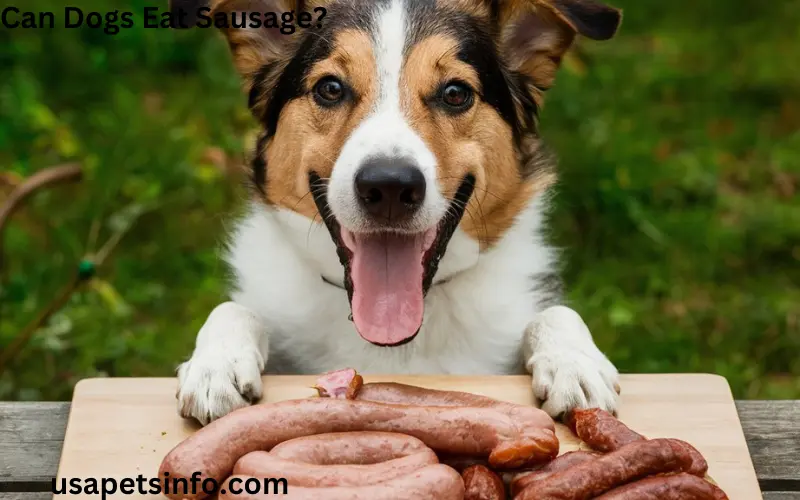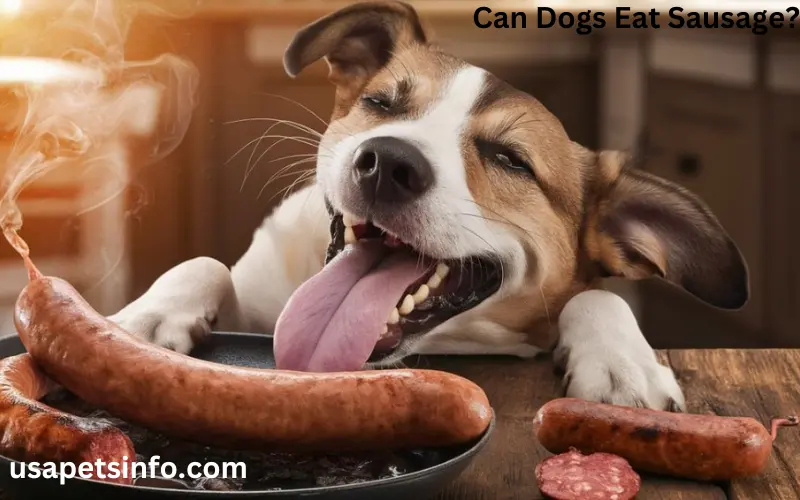“Can Dogs Eat Sausage?” Sausage is prepared by combining different sources, such as ground beef, fat, and other spices. Many methods are used during its preparation. Pork sausages taste very pleasant, so dogs love to eat them.
Can dogs also enjoy this delicious treat? Let’s move on to learn more. This detailed article provided great information about the dangers of serving sausages to canines and other related topics.
After reading this article thoroughly, you can determine whether sausage is safe or unsafe for dogs.
Can Dogs Eat Sausage?
No, sausages are considered toxic to dogs due to added ingredients. Vienna sausage, as well as other varieties, are considered unsafe for dogs.
If you want, let your friend enjoy these sausages as an occasional snack in moderation, but never make them part of a regular diet.
Ingredients
High fat: Sausages are high in fat, which can lead to obesity or digestive problems in dogs.
Seasonings and Spices: Sausages contain toxic ingredients such as garlic, onions and excess salt, which are dangerous for dogs.
Preservatives: Some preservatives, which can harm dogs’ health, keep the sausage safe in the box for a long time.
Are Sausage Toxic For Dogs Health?
Yes, sausages contain toxic and unavoidable ingredients that negatively affect dogs’ health. When dogs eat sausages that contain these harmful ingredients, they become obese and suffer from other health problems.
Due to their high fat content, sausages can cause obesity and diabetes in dogs. Dogs have a very soft stomach, which seems unable to digest hard or hot material. When hot, spicy sausage is served to dogs, it can cause various stomach problems.
Is Raw Sausage Safe For Dogs To Eat?
No, raw sausages are considered unsafe for dogs due to bacterial contamination and the inclusion of harmful ingredients. Consuming raw sausage can cause several health problems for dogs.
Because raw sausage contains Salmonella and E. coli, which can cause food poisoning in canines.
Avoid feeding raw sausage if your dog’s immune system is severely weakened.

Also Read: Can My Dog Eat Cheerios?
Can a Dog Eat Sausage Rolls?
Avoid feeding dogs sausage rolls, as they are high in fat, salt, and unhealthy ingredients.
Fatty sausages can predispose your dog to obesity, pancreatitis and many other problems, such as weight gain, which seriously affect them in their daily lives.
The amount of salt used in sausage rolls can also make dogs prone to dehydration and kidney problems.
Can I Serve Beef Sausage To My Dog?
Beef sausages may be served on rare occasions, as small amounts are suitable for dogs. A few things must be considered before serving beef sausage to dogs.
Before serving beef sausages, check the salt, spices, and fat added. If the amounts are reasonable, some may be suitable for dogs.
As with other sausages, if the beef sausage is too high in salt and fat, avoid feeding it to Kindly.
Are Sausage Patties Safe For Dogs?
Like other sausages, sausage patties contain high amounts of salt, fat and hot spices that are unsafe for dogs. Sausage patties are usually prepared for humans but can be suitable for canines if prepared and served to dogs in plain form.
Avoid using sausage patties containing too much salt, fat, and other seasonings, as they may shorten your dog’s lifespan.

Is Cooked Sausage Good For Dogs To Eat?
Cooked sausages can only be safe for dogs if they are prepared using simple methods and are free from other additives such as salt, fat, and preservatives.
When cooking sausages, avoid using extra spices to make them palatable. You can always feed your dog plain cooked sausages, which can be suitable for dogs as they do not contain harmful ingredients.
Conclusion
“Can Dogs Eat Sausage?” Since sausages contain salt, fat and other added spices, they are unsafe for dogs. A dog consuming many of these spicy foods can suffer from many health problems.
If you want your puppy always to be healthy and balanced, avoid feeding him extra stuff and spicy food so that he can maintain his health.
You can offer your dog plain cooked sausage, which does not contain added salt, fat, or spices.
